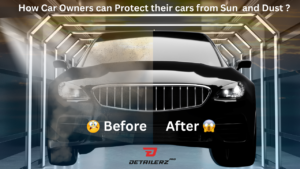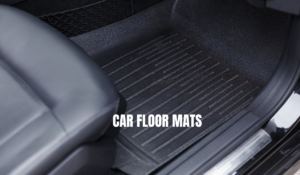The process of car painting entails the application of a protective and aesthetic layer to the exterior of a vehicle. This procedure typically includes steps such as cleaning, sanding, and priming the surface prior to the application of several paint layers. The primary objectives of car painting are to improve the vehicle’s visual appeal and to safeguard the metal from rust, corrosion, and various environmental factors. Contemporary techniques often incorporate a clear coat to enhance durability and shine. While minor touch-ups can be performed at home, professional auto shops utilize advanced tools and equipment to achieve impeccable results.

Why Car Painting is Essential for Your Vehicle?
Car painting is not just about aesthetics; it’s an essential part of vehicle maintenance. Over time, the paint on your car can fade, chip, or get damaged due to exposure to harsh environmental elements. Sun exposure, rain, snow, and road debris can all take a toll on your car’s paintwork. Scratches and dings from minor accidents or parking lot incidents can also leave unsightly marks on the surface
Here are some reasons why professional car painting is crucial:
Protection from Corrosion
The paint on your car serves as a protective barrier against moisture, salt, and dirt. When the paint is compromised, it exposes the metal underneath, which can lead to rust and corrosion. This can significantly reduce the lifespan of your vehicle. A fresh coat of paint ensures that your car’s body stays protected from the elements.
Enhancing the Aesthetic Appeal:
Applying a new layer of paint can significantly enhance the appearance of your vehicle. Whether your goal is to bring back its original hue or to create a completely new aesthetic, professional painting can transform your car remarkably. A vehicle that is well-cared-for and gleaming is invariably more attractive than one that appears aged and neglected.
Increasing Resale Value
If you have intentions of selling your vehicle in the future, ensuring that the paint is well-maintained can positively impact its resale value. Buyers are typically attracted to cars that present a polished and appealing exterior, and a new paint job can enhance your car’s visual appeal, thereby raising its value in the marketplace.
Protecting Against UV Damage:
Ultraviolet (UV) rays from the sun can cause the paint on your car to fade and deteriorate over time. UV damage leads to the loss of the vehicle’s gloss and makes the color look dull and unattractive. A fresh coat of paint not only restores your car’s appearance but also helps protect it from future UV damage.
Preventing Chips and Scratches
Small chips and scratches from rocks, debris, or minor accidents can accumulate over time, leaving your vehicle looking shabby. These imperfections not only diminish the visual appeal but also open the door for more damage. Repainting your car can help cover up these imperfections and protect your car from further damage.
The Car Painting Process at Detailerzpro
Step 1: Thorough Inspection and Cleaning
Before we begin any painting work, we conduct a detailed inspection of your vehicle’s exterior to assess the condition of the paint. This helps us identify any existing damage, such as chips, cracks, or rust spots. We also inspect the vehicle’s body for dents and other imperfections that need to be addressed before painting.
Next, we perform a thorough cleaning of the car. This involves washing the vehicle to remove any dirt, grime, and other debris. Proper cleaning is essential because it ensures that no contaminants will interfere with the paint application. We also use special tools to clean hard-to-reach areas, ensuring the entire surface is prepared for painting.
Step 2: Sanding and Surface Preparation
Once the vehicle is clean, we begin preparing the surface for the new coat of paint. This step involves sanding down the existing paint to smooth out any rough areas. Sanding also helps the new paint adhere better to the surface.
If the vehicle has any rust spots, we take extra care to remove the rust before sanding and priming. Rust can be a major issue for car exteriors, so addressing it early on ensures that your car’s new paint will last longer.
Step 3: Priming
After the surface has been properly sanded and cleaned, we apply a high-quality primer. Primer is essential because it provides a strong foundation for the paint to adhere to and helps prevent peeling or flaking in the future.
The type of primer used will depend on the material of your vehicle’s body and the type of paint you’ve chosen. At [Your Company Name], we use premium primers that are designed to protect your car and enhance the final finish.
Step 4: Painting
Once the primer has dried, we move on to the painting stage. Using state-of-the-art spray guns, we apply several coats of premium automotive paint to the vehicle’s surface. Each layer of paint is applied evenly to ensure a smooth, uniform finish.
We take great care to choose the right type of paint for your vehicle’s needs. Whether you prefer a glossy finish or a matte look, we have a wide range of colors and finishes to choose from. Our team is experienced in handling various types of paint, including metallic, pearlescent, and custom hues.
Step 5: Clear Coat Application
After the paint has been applied, we add a clear coat to protect the paint from scratches, fading, and environmental damage. The clear coat gives the paint a glossy, shiny appearance and helps preserve the color for years to come. This layer is essential in ensuring your car maintains its beautiful finish.
Step 6: Drying and Curing
Once the clear coat has been applied, the vehicle needs time to dry and cure. This process can take several hours to a few days, depending on the paint type and environmental conditions. During this time, we ensure that the car is kept in a controlled environment to prevent any dust or debris from settling on the fresh paint.
Step 7: Final Inspection
Once the paint has fully dried and cured, we conduct a final inspection of the vehicle. We check for any imperfections or areas that may need touch-ups. If needed, we perform any final adjustments to ensure the paint job is flawless.

Benefits of Choosing Professional Car Painting
While DIY car painting kits may seem like an affordable option, there are several reasons why professional car painting is the best choice for your vehicle:
Quality Materials:
Professional painters use high-quality paints, primers, and tools that guarantee a superior finish and long-lasting results. DIY kits often use lower-grade materials that may not provide the same durability.
Expert Technique:
Our technicians have years of experience and the skill to apply paint smoothly and evenly, avoiding common mistakes like streaking or uneven coverage. Professional painters understand the science behind the materials and techniques, ensuring your car looks its best.
Time and Effort:
Car painting is a time-consuming process that requires precision and patience. DIY methods can take days, while professional services can get the job done quickly without compromising quality.
Proper Equipment:
Professional car painting requires specialized equipment, such as spray guns and drying booths, that ensure a flawless finish. DIY kits simply can’t replicate this level of precision.
Long-lasting Results:
With proper preparation, high-quality paint, and the right application, professional car painting ensures that your vehicle’s paint job will last for years to come.
Cost of Car painting
The cost of car painting in India can vary widely depending on several factors, typically ranging from ₹10,000 to ₹2,00,000 or more. Here’s a breakdown of the factors that influence pricing:
Type of Paint: Basic paint jobs using standard enamel or single-stage paints cost between ₹10,000 to ₹25,000. However, premium options like metallic, pearl, or custom colors can cost ₹30,000 to ₹60,000 or more.
Quality of Service: A standard paint job with minimal preparation will cost less, while a high-end job involving extensive preparation, multiple coats, and a clear coat can increase the cost, potentially reaching ₹50,000 to ₹2,00,000.
Vehicle Size and Model: Larger vehicles such as SUVs or trucks generally cost more to paint than smaller cars, with costs for bigger models ranging from ₹30,000 to ₹1,50,000.
Repairs and Preparation: Additional repairs like rust treatment or dent fixing will increase the overall cost, depending on the extent of the damage.
Why Choose Detailerzpro for Your Car Painting Needs?
In working at Detailerzpro, we have established our word by work for delivering premium car painting services that are better than the vision (standards) of our clients. Here’s why you should choose us for your next car painting job:.
Expert Technicians:
Our experienced staff has many years of experience on the job, all of whom are certified in every aspect of your car’s painting process.
Premium Materials:
We only use the absolute best paints, primers and clear coats so your car will look its best and be properly guarded.
Attention to Detail:
We are highly meticulous with our work and give every detail, right down to the millimeters, careful consideration, that your vehicle will be finished to look as good as new.
Affordable Pricing:
Although we provide best-in-class service, we also provide value-based pricing that’s within your budget.
Customer Satisfaction:
Our customers are paramount and we always aim for your complete satisfaction in all aspects of our service. We are closely partner with you to get to know your requirements and provide you with a solution beyond your expectations.

Book Your Car Painting Appointment Today
Ready to level-up your car it deserves? Whether you’re looking to restore its original color, repair damage, or change its appearance, [Your Company Name] has you covered. Our professional car painting services will leave your vehicle looking stunning and protected for years to come.
Contact us today to schedule your car painting appointment and experience the difference our expert services can make. Don’t settle for less—choose the best for your car’s appearance and longevity.
FAQ’S
1. What is car detailing?
Car detailing is a thorough cleaning and restoration process that goes beyond a regular wash. It involves deep cleaning, polishing, and waxing the interior and exterior of your vehicle to restore its original appearance and protect it from damage.
2. How long does a full car detailing take?
The time it takes to detail your car depends on its size and condition. On average, a full car detailing service can take between 2 to 4 hours.
3. Do I need to schedule an appointment in advance?
While we accept walk-ins, we highly recommend scheduling an appointment to ensure availability, especially during peak hours.
4. What is included in a full car detailing service?
Our full detailing service typically includes exterior washing, waxing, and polishing, as well as interior vacuuming, upholstery cleaning, dashboard detailing, and glass cleaning.
5. Can you remove stains from my upholstery or carpets?
Yes! We offer specialized stain removal treatments for upholstery, carpets, and other fabrics to restore your interior’s cleanliness and freshness.
6. Will detailing remove scratches or dents?
While detailing can help minimize the appearance of surface scratches and imperfections, it doesn’t repair deep scratches or dents. For that, we recommend professional bodywork services.
7. Is detailing safe for my car’s paint?
Absolutely! Our detailing products are safe and designed specifically to protect your car’s paint while enhancing its shine. We use high-quality waxes and polishes that provide a protective layer against environmental damage.
8. What types of vehicles do you detail?
We detail all types of vehicles, including sedans, SUVs, trucks, motorcycles, and even boats and RVs!





